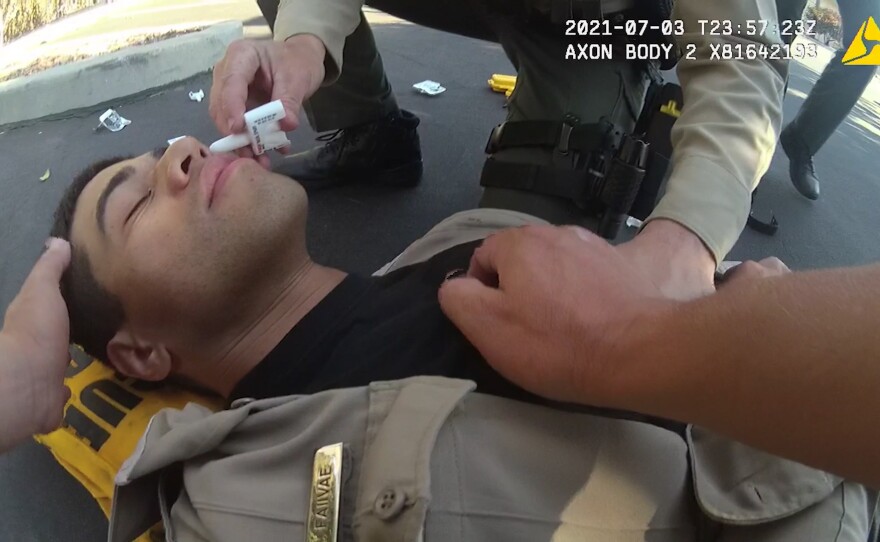The video released last week was dramatic.
After packaging up some fentanyl taken from a suspect’s vehicle, Deputy David Faiivae suddenly stiffened and fell back. Almost immediately, his training officer, Deputy Scott Crane administered naloxone - given to people who have overdosed on opioids.
RELATED: San Diego Sheriff’s Fentanyl Video Alarms Medical Experts
The blowback came within hours. Medical professionals across the country said what the video showed was not an example of overdosing on fentanyl. Many lashed out at the Sheriff’s Department for releasing a video many said mis-portrayed a situation that plays out with deadly consequences across the country every day.
KPBS talked to Dr. Carla Marienfeld, Director of UC San Diego's Addiction Recovery & Treatment Program about what the video shows and what it doesn't.
“I think it’s helpful to release the full version so that people can see as much as you can see from a body cam," she said.
Marienfeld had not seen the unedited version when KPBS interviewed her Friday afternoon.
RELATED: San Diego Sheriff Releases Details On Disputed Fentanyl Video, But Questions Remain
But with what she has seen, she said doesn’t feel comfortable describing what happened to Deputy David Faiivae as an overdose.
Marienfeld said she’s more concerned about the unintended message the videos, edited or unedited, could send.
“The most important message is that people shouldn’t be afraid of incidental exposure to fentanyl in a limited way like this to where they would not act to help someone who might be overdosing," she said.
One thing that is new from the unedited version comes when Deputy Faiivae is answering questions from a paramedic.
RELATED: San Diego Saw Sharp Increase In Fentanyl Deaths Throughout Pandemic Lockdowns
The paramedic is questioning Faiivae to determine if he's fully conscious and aware of what's going on.
“Any medical history that you know about?” the paramedic asks.
“Probably the sixth or seventh time I’ve fallen on my head," responded Faiivae.
That leads to an obvious question as to whether Deputy Faiivae has a history of fainting, and if that’s what happened here.
Dr. Marienfeld said that it's hard to tell. “I think that you want to take into consideration the fact that the patient may have had previous head injuries and whether or not some of what he was presenting with currently was related to him hitting his head in any way," she said.
Then there’s the question of a toxicology test. The Sheriff’s Department now says one was not done at the hospital. Dr. Marienfeld said that’s not unusual.
“In the emergency room, you’re trying to be as efficient as possible and helping somebody... In that situation where the story was consistent with a fentanyl exposure... it wouldn’t necessarily make sense to check to see if there was fentanyl in his system, particularly if the story you heard as the physician was that the patient responded to naloxone.”
KPBS reached out to the Sheriff’s Department for clarification, but in an email, they said they weren’t doing any interviews on the subject - leaving this story kind of how it started, with way more questions than answers.








